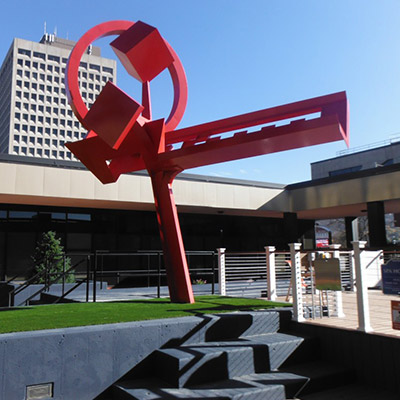Reviewed by Sherri Strichman
There is apparently something wrong with my imagination. When I heard that Tri-Cities Opera would be doing a concert version of Verdi’s La Traviata, I thought I would be seeing “stand and sing” opera, and I would be bored. Wrong. It was fantastic!

Meroë Khalia Adeeb as Violetta
Photo by Randy Cummings, Bunn Hill Photo
more images
Everyone on stage was well-dressed, -coifed and -made up (credit to costume coordinator Jana Kucera and makeup and hair designer Shushu Vaughn). There was a bit of tittering in the last act when lighting designer John Vestal brought the lights up on the two downstage window frames when someone “opened the window,” but it was good-natured as if the audience was enjoying an in-joke.
Really, I didn’t feel anything was missing from this production.
The orchestra was onstage at the back, with the performers in front of them. Directed superbly by Vlad Iftinca, the opening prelude was a thing of beauty. Throughout the opera the orchestra supported neatly without overpowering the singers.
The chorus, prepared by John Elam, sounded wonderful, although a little heavily weighted on the female side, outnumbering the men more than two to one. Even so, they were clean and crisp, and with the dynamics called for in the score. The only negative for me was the laughter at the end of party choruses, which sounded fake, but what can you do when you’re a chorister and told to “sound like you’re having a good time”?
The supporting roles were all well-sung and well-acted. Mary Beth Nelson was excellent as Flora. Jake Stamatis, Scott Purcell, Andrew Hiers and Jordan Schreiner as, respectively, the Marchese, Barone Douphol, Dr. Grenvil and Gastone added color, humor, menace and pathos to the proceedings. Stacey Geyer struck just the right note in the role of Annina, and Cole Tornberg, Bill Snyder and Dante Doganiero all acquitted themselves well.
Johnathan Riesen was a passionate Alfredo, well-received by the audience.
I haven’t previously had the pleasure of hearing Timothy LeFebvre sing, and a pleasure it certainly was. His presence is commanding, and his beautiful voice was round and bright and deep and with great high overtones, all at the same time. His high notes were thrilling. His Germont was stern and sympathic by turns. The audience loved him, and understandably so.
As Violetta, Meroë Khalia Adeeb gave a stunning performance. Her voice has so many shadings, it was well-suited to the various emotions and situations undergone by the character during the course of action of this piece. The “Ah fors’e lui . . . sempre libera” turned wistful yearning into pleasure-seeking energy. The extended Act II duet with Germont and her death scene were heartbreaking.
This was the best time I’ve had at TCO since I started reviewing. Worth the price? Absolutely. Sadly, yesterday’s matinee (Oct. 16) was the only performance. I hope it was financially successful to the point where the company can afford two performances of this type of production in the future.




































